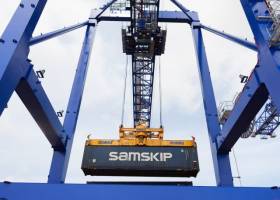Displaying items by tag: Blockchain
Major UK Ports Operator Aims for Frictionless Trade With 'Blockchain' Technology
#BrexitBlockchain - A leading UK port operator, Associated British Ports (ABP) has signed a Memorandum of Understanding (MOU) to work with digital logistics enabler Marine Transport International (MTI). This is to create one of Europe’s first detailed pilot programmes to examine the implementation of blockchain technology to improve port connectivity.
ABP operates 21 ports across the UK, Afloat adds among them Hull using Irish-built container cranes. Collectively these ports handling 25% of the country’s seaborne cargo. As such, it connects with a huge number of businesses involved in the logistics industry. Being able to transfer all types of cargo quickly and smoothly through its ports is critical.
“We handle almost 100 million tonnes of cargo across all sectors every year so we are a significant gateway for our customers’ supply chains,” said Jens Skibsted Nielsen, Commercial Director at ABP. “This MOU with MTI is a demonstration of our commitment to technical innovation and finding new ways to improve the UK’s supply chains.”
Ron Crean, Group Head of Marketing for ABP and leader of this project, commented, “Our aim is to support our customers in achieving frictionless trade. Based on the results from our previous proof of concept project, we are now looking at ways to deploy enterprise-level solutions that can deliver trust, security and speed.”
As part of the agreement, ABP will commit to participating in MTI’s blockchain solution in pilot shipments. Currently, each party in a supply chain, from shipper to haulier and from port operator to carrier, uses different systems, which do not all talk to each other efficiently. MTI’s technology could offer a way to securely link these disparate ways of working and could bridge the silos to reduce time spent on manually re-entering data, ensuring a single version of the truth.
“Blockchain is the buzzword of the logistics industry at the moment,” said Jody Cleworth, founder and CEO of MTI. “Yet some of the projects making a big splash are blockchain in name only. Blockchain-enabled technology has the potential to provide a transparent, secure and accurate way of capturing and sharing data with key parties, but for MTI the critical part is interoperability – it has to be able to openly connect with existing systems. The logistics industry is awash with proprietary technology that forces users to work in a certain way – with blockchain, we can connect all those systems to ensure data is accurately and quickly shared, helping speed-up and simplify the flow of trade in and out of the UK.”





























































